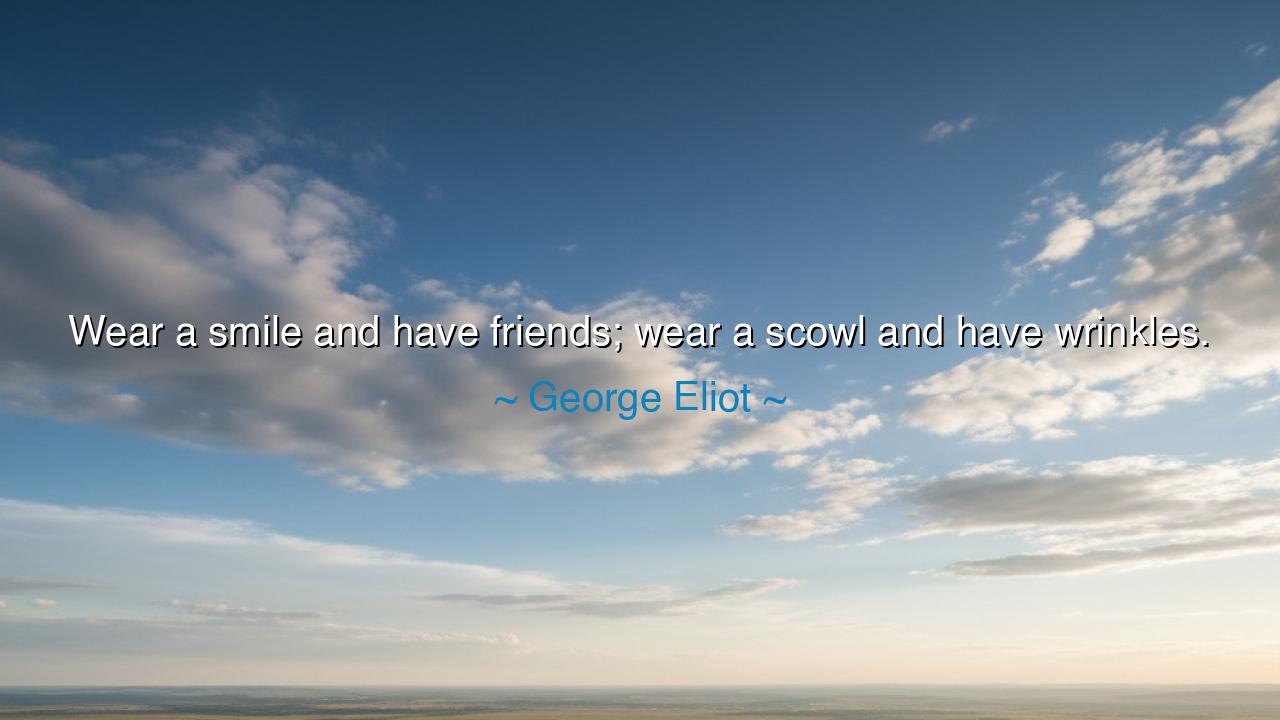
Wear a smile and have friends; wear a scowl and have wrinkles.






The words of George Eliot—“Wear a smile and have friends; wear a scowl and have wrinkles.”—are both light and profound, wrapping truth in a cloak of humor. They speak to the dual nature of human expression: the smile, which opens doors and gathers companions, and the scowl, which closes the heart and carves bitterness into the face. Behind this witty observation lies a timeless teaching: the spirit within us shapes not only our destiny in friendship, but even the countenance we carry into old age.
The ancients would have understood Eliot’s wisdom as harmony between inner and outer life. For the smile is more than an expression of the lips; it is the radiance of the soul breaking forth into the world. It attracts, it welcomes, it builds bridges. To smile is to say: “I am open to you, I wish you well.” Thus, friends are drawn like birds to sunlight. But the scowl is its opposite. It declares mistrust, discontent, and anger. Though it may protect pride for a moment, over time it drives others away, and its shadow hardens into the very lines of the face. So Eliot warns that while the smile begets fellowship, the scowl begets only wrinkles—marks of a spirit closed upon itself.
History is filled with figures whose countenance reflected their spirit. Think of Abraham Lincoln, whose life was burdened with sorrow, yet whose weary smile endeared him to the people. In the midst of civil war, he told stories, shared humor, and carried warmth in his expression. This made him not only a leader but a friend to the common man. Contrast this with the portraits of Joseph Stalin, whose stern and suspicious glare struck fear into all who beheld him. One face gathered loyalty born of love, the other obedience born of terror. Eliot’s words remind us that the face we wear is the life we build.
George Eliot, born Mary Ann Evans, lived in Victorian England, a society bound by appearances and conventions. She herself chose a life outside convention, living openly with a partner without marriage, defying judgment with courage. She knew the cost of scorn, and also the healing power of kindness. In her writings, she often explored the hidden depths of ordinary lives, showing that human connection is forged not by status but by warmth and sincerity. From her life and her pen, she observed that those who wear smiles win the fellowship of others, while those who persist in bitterness grow isolated—and the mark of that bitterness shows not only in the soul but upon the body itself.
The lesson is clear: the spirit becomes flesh. If you wear anger long enough, it etches itself into your brow. If you carry joy, it lights your eyes and softens your features. What is within inevitably shapes what is without. Thus, we are not powerless; we are sculptors of our own countenance. Every smile is a chisel carving beauty into the face; every scowl is a hammer striking harsh lines upon it.
But this teaching is not merely about appearances. It is about the deeper truth of how we relate to others. Friends are not gathered by wealth, nor by force, nor by eloquence as surely as they are by warmth. A sincere smile is the key that unlocks trust. It makes strangers allies, and allies friends. By contrast, bitterness breeds loneliness, and loneliness carves its record upon the body. Thus, Eliot’s playful words conceal a serious counsel: to choose the smile is to choose life, love, and community.
Practically, this wisdom calls us to practice daily the art of smiling. Begin with those closest to you: greet your family not with the heaviness of the day but with the warmth of welcome. Carry your smile into the streets, to strangers, to those who need reassurance. Even when burden presses upon you, choose to soften your expression, for the act of smiling not only comforts others but also heals yourself. In time, you will find that the friendships you form, and even the face you bear into old age, are the fruits of that choice.
Thus, George Eliot’s words ring across time: “Wear a smile and have friends; wear a scowl and have wrinkles.” It is a teaching of joy hidden in jest, a reminder that the world reflects what we show it. Choose to smile, and you will build a circle of love around you; choose to scowl, and you will grow old in loneliness. Let us then, like the ancients, take up the practice of smiling—not as shallow show, but as the outward sign of an inner spirit resolved to meet the world with warmth, courage, and grace.






AAdministratorAdministrator
Welcome, honored guests. Please leave a comment, we will respond soon